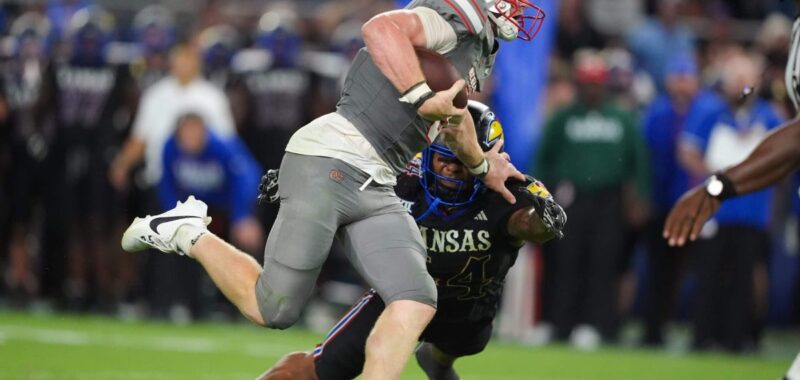By David Ubben, Justin Williams and Alex Andrejev
Matthew Sluka — the former starting quarterback at UNLV who left the school after a widely publicized dispute over name, image and likeness payments — signed with James Madison, the school announced Tuesday, reuniting him with two of his former coaches.
Sluka, who transferred to UNLV from Holy Cross, announced after UNLV’s 3-0 start in 2024 that he would utilize a redshirt year and sit out the remainder of the season after “representations” made to him “were not upheld.”
Sluka’s father said there was essentially a verbal agreement in place to pay Matthew $100,000 for his final season but that he had only been given $3,000 for moving expenses and was not paid anything else from UNLV’s name, image and likeness (NIL) collective.
Blueprint Sports, which operates UNLV’s collective, said it did not “finalize or agree to” any offers while Sluka was on the team other than for one community engagement event. Blueprint Sports CEO Rob Sine told multiple outlets the collective made a single payment of $3,000 to Sluka.
UNLV said Sluka’s agent made “financial demands” to the school and its collective to keep playing, and the school “interpreted these demands as a violation of the NCAA’s pay-for-play rules, as well as Nevada state law.” The school said it honored “all previously agreed-upon scholarships” for Sluka.
Sluka finished his three-game, fifth-year collegiate season at UNLV throwing for 318 yards, six touchdowns and one interception.
𝐒𝐈𝐆𝐍𝐄𝐃 ✍️
Welcome to the Valley, @matthewsluka❗#GoDukes pic.twitter.com/KaG4cvBGgi
— JMU Football (@JMUFootball) January 14, 2025
A coaching reunion
Sluka’s move to James Madison, which finished 9-4 last season, reunites him with head coach Bob Chesney and offensive coordinator Dean Kennedy. Chesney was Sluka’s head coach at Holy Cross from 2020-23. As a senior in 2023, Sluka was a team captain and finished fourth in voting for the Walter Payton Award as the top FCS player.
Kennedy was the quarterbacks coach for the Crusaders in 2022 and moved up to offensive coordinator in 2023 while also coaching quarterbacks. Chesney brought Kennedy with him to James Madison after the 2023 season for the same position.
Sluka’s sudden, unceremonious exit from UNLV after the NIL dispute raised eyebrows from coaches across the sport and presented some difficulties in finding a new home. Reconnecting with coaches who knew him before the UNLV exit and didn’t need anyone to vouch for his character off the field or abilities on it was a natural fit. — David Ubben, college football writer
What’s JMU’s NIL, financial outlook?
Despite the circumstances of his departure from UNLV, Sluka’s connection to Chesney and Kennedy undoubtedly played the key role in this decision, considering JMU hasn’t been a big spender in the NIL market to this point. Even with an annual athletics budget of roughly $70 million — one of the highest among Group of 5 programs — JMU athletics is heavily subsidized by the university and will only bring in about $2 million a year from Sun Belt conference media rights.
The Dukes had a very modest NIL budget last year, fronted largely by the Montpelier Collective, which is led by Cliff Wood, a former JMU senior associate AD for development. The collective works closely with JMU athletics and has plans to be officially folded under university management by summer 2025 in anticipation of the House v. NCAA settlement receiving final approval.
However, the chief reason for transitioning Montpelier Collective into the department is that JMU does hope to participate in some degree of revenue sharing with its athletes moving forward, assuming the House settlement goes through.
“Those are conversations we’re having right now as an administrative team,” JMU athletic director Matt Roan told The Athletic last summer regarding revenue sharing. “We need to set goals for where we are and for where the puck is heading as well. For us, a version of revenue sharing — a uniquely JMU version of revenue sharing — is certainly something that we’re interested in.”
Revenue sharing would be voluntary for all schools under the House settlement, and it’s unlikely that many (if any) G5 universities would have the resources to share anywhere near the expected $20-million-plus annual cap. But JMU’s commitment to be as competitive as possible in that space reflects its big-picture athletics ambitions.
It also suggests the Dukes’ new quarterback will reap some of those benefits, even if it’s not to the extent anticipated when he left UNLV. — Justin Williams, college sports writer
Required reading
(Photo: Kyle Rivas / Getty Images)

